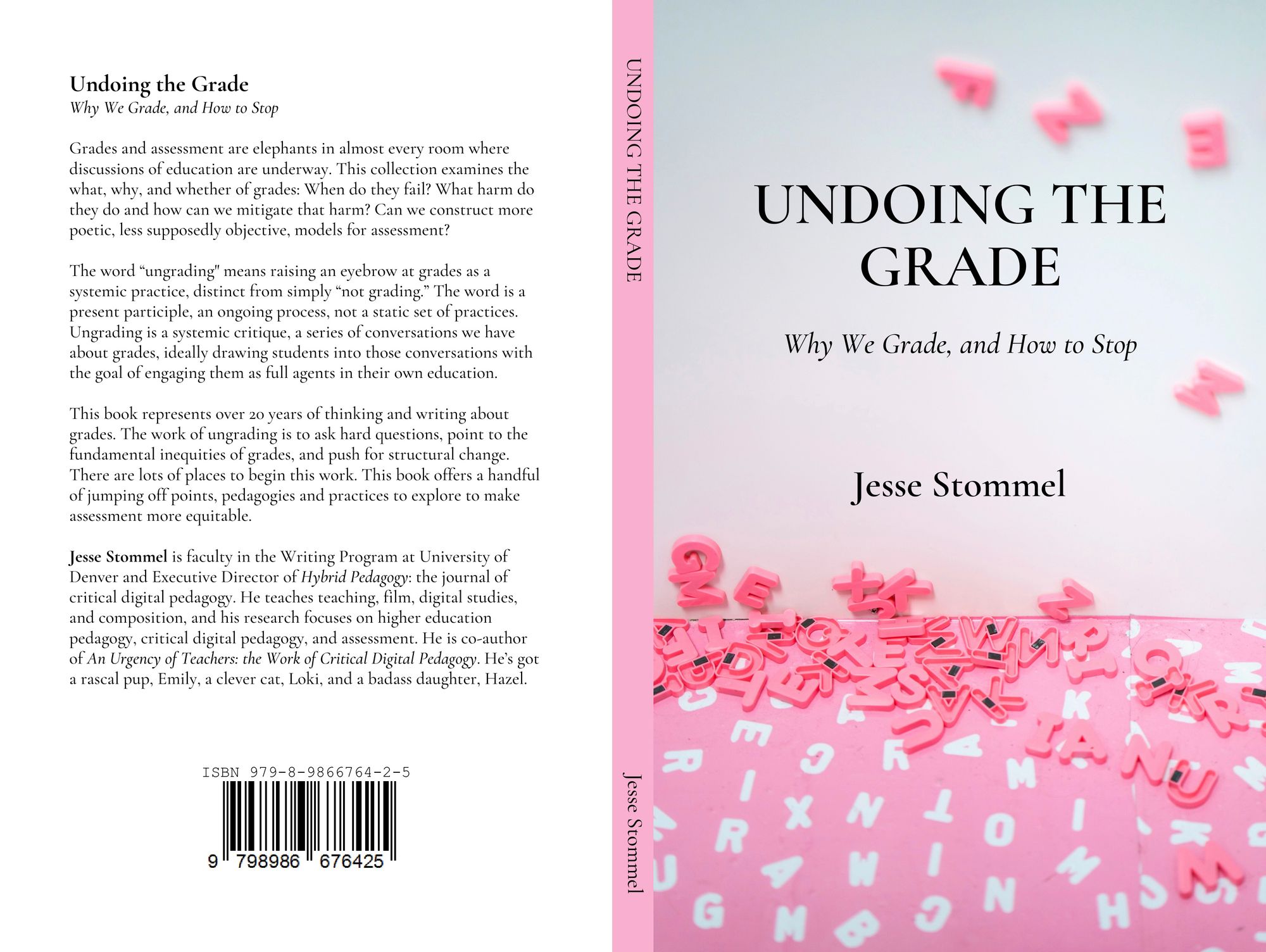What is Ungrading?: a Q&A
This piece was revised and expanded for my new book, Undoing the Grade: Why We Grade, and How to Stop, available now in paperback and Kindle editions.
On April 26, offered a keynote at University of Calgary's Conference on Postsecondary Learning and Teaching. My presentation focused on ungrading and alternative approaches to assessment. Too many of our approaches to grades treat students like they’re interchangeable and fail to recognize their complexity. Can we imagine flexible approaches to assessment, pedagogies which center intrinsic more than extrinsic motivation, encouraging and supporting learning, rather than policing behavior?
As I've written before, "We have to design for the least privileged, most marginalized students, the ones more likely to have felt isolated even before the pandemic: disabled students, chronically-ill students, black students, Indigenous students, queer students, and those facing housing and food insecurity. We need to write policies, and imagine new ways forward, for these students, the ones already struggling, already facing exclusion."
The organizers of the event asked me to answer a few questions in advance of my presentation. Here is what I had to say:
Q: Tell us a bit about who you are and your areas of research.
A: I've been teaching for almost 24 years and doing faculty development work for 20 years. I am also co-founder and executive director of Hybrid Pedagogy: the journal of critical digital pedagogy. My research is focused on higher education pedagogy, specifically critical digital pedagogy, ungrading, and alternative approaches to assessment.
Q: What is “ungrading?”
A: "Ungrading" is a term I've been using in workshops and presentations for almost 15 years. In 2017, I began a series of posts on my own blog, which have helped continue to frame the term. I’ve defined ungrading as “raising an eyebrow at grades as a systemic practice, distinct from simply ‘not grading.’ The word is a present participle, an ongoing process, not a static set of practices.” Ungrading is a systemic critique, a series of conversations we have about grades, ideally drawing students into those conversations with the goal of engaging them as full agents in their own education.
I don't believe that ungrading constitutes a set of best practices, because different students learn in different ways at different times with different teachers in different disciplines at different institutions. So, the work of teaching, the work of reimagining assessment, is necessarily idiosyncratic.
Q: What does collective transformation mean in the context of assessment?
A: Ultimately, what's most necessary is that we ask hard questions of our traditional approaches to assessment. Grades are a relatively recent technology, and how we use them in education has a considerable influence on our pedagogical approaches. There is a distinction to be made between grades and assessment. But at this moment, I'd say our approaches to assessment, our syllabi, the work we ask students to do, the shape of academic labour, is increasingly structured by grades. Rather than wondering at how we fit our pedagogies into systems that have become increasingly standardized and quantitative, we need to look askance at those systems, and find ways to dismantle barriers to teaching and learning.
Q: Why do you think assessment is such a big issue right now?
A: Grades are inequitable. As they are increasingly centered at our institutions and within our educational technologies (like the learning management system), the inequities of grades are exacerbated, and our most marginalized students are further marginalized. This is one reason it has become imperative that we rethink our approaches to assessment.
The work of teachers is also increasingly precarious. The majority of teachers in higher education work in contingent, adjunct, or sessional positions. And so, teachers are rightfully skeptical of approaches to assessment that increase our labor with little benefit to us or students. Teachers are rightfully skeptical of approaches to assessment that create a culture of suspicion and competition, while further fracturing the already strained relationships between students, between teachers, and between students and teachers.
Q: What can people expect from your pre-conference workshop?
A: Because asking hard questions about grades as a system is at the core of ungrading, the workshop will be structured as a conversation. We'll start with a brief presentation and Q-and-A, but we'll also spend time doing activities, sharing our own approaches and the hurdles we face in our practice, and discussing possible ways forward.
Our first goal will be to reconsider how we talk to students about grades and assessment, which begins with the words we write in our syllabi (especially policy statements around grades, participation, cheating and plagiarism, etc.).
For folks who couldn't attend this virtual event, for whatever reason, my notes are in an evolving open-access Google Doc at bit.ly/ungrading, which includes slides from previous presentations, activities, practical resources, and lots of recommended reading from lots of people and perspectives.


